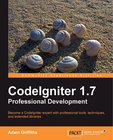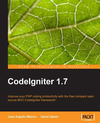-
Packt Publishing has published a new book on the RAD PHP framework CodeIgniter version 1.7. The book CodeIgniter 1.7 Professional Development written by Adam Griffiths, has the slogan “become CodeIgniter experts with professional tools, techniques and extended libraries”.
Just from the slogan you can see a slightly different tone then the book CodeIgniter 1.7 from Packt Publishing, which in my opinion has the purpose of showing what the CodeIgniter framework can do.
This book has the purpose of showing how can you develop professional applications, or at least until proven otherwise, stay tuned to find out!
An argument for the slogan is the target audience like is defined in the “Who this book is written for” section, which contains the phrase:
Basic knowledge of CodeIgniter will be helpful.
A dangerous phrase in my opinion, because it can scare off a beginner, even though in the book it looks like all the steps are described starting from server installation.
If from the first book I was expecting a general presentation of the framework, now I’m curios to see if the examples are more ample and more concrete.
From the sample chapter it looks like there is a lot of code. As long as it is logical I thing it’s a good thing, a lot of times is easier to understand code, which you will after all write and you can take as an example, then theory.
But more about this book after I’ll get to read it.
To be continued…
-
CodeIgniter is an open-source PHP framework build for RAD.
The book CodeIgniter 1.7 from PacktPublishing, written by Jose Argudo Blanco and David Upton is trying to build an overall image of of the CodeIgniter framework, as an addintion to the user guide.The book is not a reference, and that becomes obvious with every chapter, each time a new feature of the CodeIgniter framework is introduced the user is directed to the corresponding page of the module in the user guide or wiki. Even more, suggestions are made for alternative modules that can achieve a similar task in a different way.
Authors say that only minimal knowledge of PHP is necessary to read this book, a promise that is hard to keep in my opinion, usually books that target novice to medium skill readers are saying something like that. To my surprise they ware right, the reader only needs PHP4 knowledge. And when it comes to OOP not even PHP5 features are required, just the PHP4 object model. In this book even the copping objects by reference is described! Of course copping objects by reference is no longer a relevant issue with PHP5, but taking this in to consideration that is an PHP4 framework it was a good idea to mention and explain it. It seems like there are still PHP4 server on the Internet… that is just sad…
Reading the book flashbacks came to my mind with pieces of code written directly in PHP and the hell of debugging them, trying to understand other peoples code… what times… horribly of course. The reasoning behind this concepts of re usability in a framework is just great: “Possibly you like typing regex. Some people like lying on a bed of nails…”. When a developer, especially a beginner, is reading something like this it makes him understand that you don’t have to reinvent the wheel each time, but just use solutions already developed by others.
Comparing between different available solutions I believe is the most funny part of a book like this. Is difficult or even impossible to compare for instance Zend Framework or even CakePHP with CodeIgniter. After all almost all frameworks say the same thing, just download and start working. Personally when I need to use a module from Zend Framework I just load the autoloader and get to work. The comparison shows CodeIgniter as a winner for most users, as expected, the reasoning behind that claim is pretty honest. Afterall is a small framework and does not have complex features like autogenerating CRUD. I remember a Java book where the author was representing the fact that C++ is faster then Java as a disadvantage, of course was just silly.
I sometimes had the impression that the terms were wrongly defined. The authors are using “small” mistakes in terms to explain what’s actually happening in the background. When you are working with MVC frameworks some of the notions are simple and obvious, but for a developer that’s not familiar with that terms there are quite hard to comprehend.
And to continue with the mistakes in the book, I’ve found a few. Quite a difficult moment when you start learning something new. Fortunately there are quite obvious because they result in errors, and if you read chapter after chapter you’ll know what the issue is and how to fix it.
Examples are pretty consistent and well documented. When a new concept or module is introduced it is fully explained in detail.
The resulting apps are not very complex, for instance at the end of the book there isn’t a full complex app like a CMS, rather modules and the way there are combined is explained. The user will have to decide in the end how will his app look and feel. For instance in chapter 13 pagination and ordering is explained. When pagination is used everything is OK, but when ordering is introduced the pagination begin to slip. It took me about 5-10 minutes to fix the issue, but it would have been nice for the authors to fix the issue themselves.
Overall is a good book, especially for users that have no prior knowledge of CodeIgniter, is just like is presented by the authors, a book for developers that want more productivity in there work or just what to see what other tools are out there. The book does not present full solutions like a CMS or a shopping cart, but rather what this framework has to offer.
An advanced developer can understand from this book the structure of the CodeIgniter framework, possibly to compare it to other popular frameworks, without loosing time with complex and irrelevant examples.
-
CodeIgniter is an open-source PHP framework, build for RAD development. This framework is continuously growing in popularity, probably especially since people realized that is much easier to use an open-source framework instead of developing an internal one, but that’s another story. The CodeIgniter 1.7 book from PacktPublishing, written by Jose Argudo Blanco and David Upton is building a big picture about the CodeIgniter 1.7 framework, as an addition to the reference manual.
After all every respectable framework has an detailed reference, with usability examples, more or less comprehensible. When it comes to learning an framework (and not only), an reference is usually not the best place to start from, because is hard to get the big picture when you can only receive atomic answers. That’s why we buy books this days, to have a general image with problems and solutions. And this is where the CodeIgniter 1.7 book comes in.
Initially, when I’ve seen that the title has the version number of the analyzed framework I was a little pessimistic, because usually when you buy a book you don’t want it to be tight up to particular version, isn’t it? Well, not exactly… I had a similar issue with Zend Framework, most books use “older versions” (ex: 1.5-1.6) and I wanted to see an approach using the new features from version 1.8 or greater. After all when you start learning something you usually want the latest version of the framework or what ever it is that you are learning, and when new features appear it will be much easier to simply look then in the reference guide since you already know the basics.
This book seams to start from the beginners level and progressively describe both basic elements as well as the most common problems the user may encounter when developing apps using the CodeIgniter framework. The sample chapter, looks pretty well structured and easy to understand, and from the table of contents it seams to approach all the important subjects. With the hope that the rest of the book will be just as well structured (I’m actually judging a book by the cover?) and a second part to this review will follow I can’t barely wait for the book.
To be continued…

